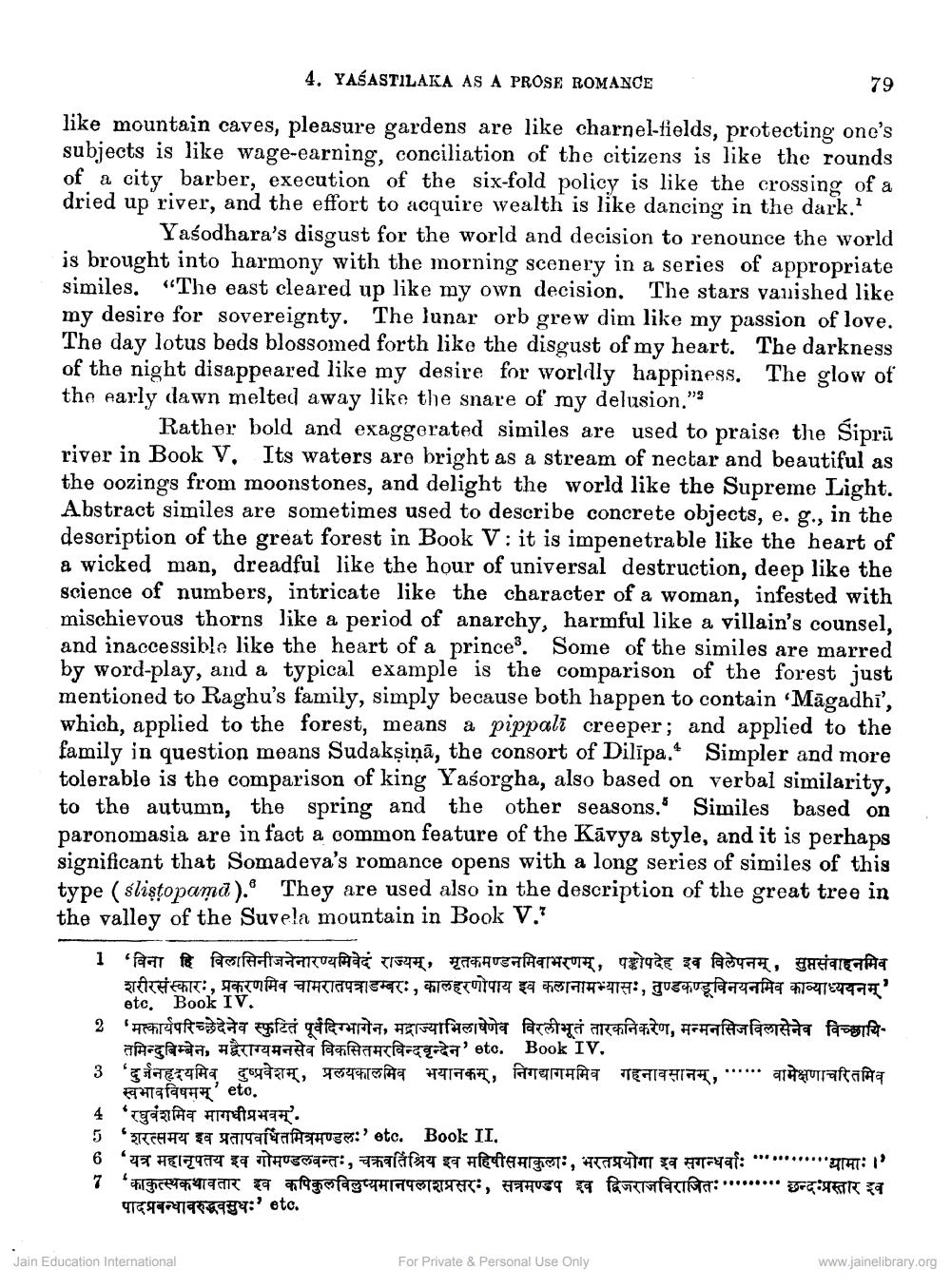________________
4. YASASTILAKA AS A PROSE ROMANCE
like mountain caves, pleasure gardens are like charnel-fields, protecting one's subjects is like wage-earning, conciliation of the citizens is like the rounds of a city barber, execution of the six-fold policy is like the crossing of a dried up river, and the effort to acquire wealth is like dancing in the dark.' Yasodhara's disgust for the world and decision to renounce the world is brought into harmony with the morning scenery in a series of appropriate similes. "The east cleared up like my own decision. The stars vanished like my desire for sovereignty. The lunar orb grew dim like my passion of love. The day lotus beds blossomed forth like the disgust of my heart. The darkness of the night disappeared like my desire for worldly happiness. The glow of the early dawn melted away like the snare of my delusion."
Rather bold and exaggerated similes are used to praise the Śipra river in Book V. Its waters are bright as a stream of nectar and beautiful as the oozings from moonstones, and delight the world like the Supreme Light. Abstract similes are sometimes used to describe concrete objects, e. g., in the description of the great forest in Book V: it is impenetrable like the heart of a wicked man, dreadful like the hour of universal destruction, deep like the science of numbers, intricate like the character of a woman, infested with mischievous thorns like a period of anarchy, harmful like a villain's counsel, and inaccessible like the heart of a princes. Some of the similes are marred by word-play, and a typical example is the comparison of the forest just mentioned to Raghu's family, simply because both happen to contain 'Magadhi', which, applied to the forest, means a pippali creeper; and applied to the family in question means Sudakṣiņa, the consort of Dilipa. Simpler and more tolerable is the comparison of king Yasorgha, also based on verbal similarity, to the autumn, the spring and the other seasons. Similes based on paronomasia are in fact a common feature of the Kavya style, and it is perhaps significant that Somadeva's romance opens with a long series of similes of this type (slistopama). They are used also in the description of the great tree in the valley of the Suvela mountain in Book V."
в
1 'विना हि विलासिनीजनेनारण्यमिवेदं राज्यम्, मृतकमण्डनमिवाभरणम्, पङ्कोपदेह इव विलेपनम् सुप्तसंवाहनमिव शरीरसंस्कारः, प्रकरणमिव चामरातपत्रा डम्बरः, कालहरणोपाय इव कलानामभ्यासः, तुण्डकण्डूविनयनमिव काव्याध्ययनम् '
Book IV.
etc.
2 ' मक्कार्यपरिच्छेदेनेव स्फुटितं पूर्वदिग्भागेन, मद्राज्याभिलाषेणेव विरलीभूतं तारकनिकरेण, मन्मनसिजविलासेनेव विच्छायितमिन्दुबिम्बेन, मद्वैराग्यमनसेव विकसितमरविन्दवृन्देन ' etc. Book IV.
वामेक्षणाचरितमिव
3 'दुर्जनहृदयमिव दुष्प्रवेशम्, प्रलयकालमिव भयानकम्, निगद्यागममिव गहनावसानम्, स्वभावविषमम्' eto.
4 'रघुवंशमिव मागधीप्रभवम्.
5 ' शरत्समय इव प्रतापवर्धितमित्रमण्डल : ' etc. Book II.
6 ' यत्र महानृपतय इव गोमण्डलवन्तः, चक्रवर्तिश्रिय इव महिषीसमाकुलाः, भरतप्रयोगा इव सगन्धर्वाः 7 ' काकुत्स्थकथावतार इव कपिकुलविलुप्यमान पलाशप्रसरः, सत्रमण्डप इव द्विजराजविराजितः पादप्रबन्धावरुद्धवसुधः' etc.
Jain Education International
79
For Private & Personal Use Only
..........ग्रामाः ।' छन्दः प्रस्तार इव
www.jainelibrary.org




